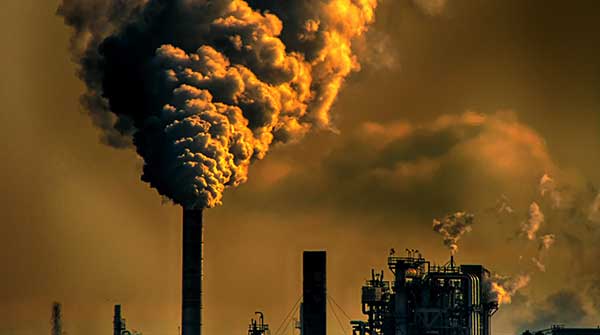The solution? Shift the carbon tax burden from Canadian’s shoulders to carbon emissions spewing imports from China
 In my last column, in early July, I wrote about the irony that a self-described “progressive” Liberal government kept in power by a deeply socialist NDP, both supposedly dedicated to protecting the poor, was fighting a war on carbon emissions whose costs, the Parliamentary Budget Officer has calculated, fall disproportionately on lower-income Canadians.
In my last column, in early July, I wrote about the irony that a self-described “progressive” Liberal government kept in power by a deeply socialist NDP, both supposedly dedicated to protecting the poor, was fighting a war on carbon emissions whose costs, the Parliamentary Budget Officer has calculated, fall disproportionately on lower-income Canadians.
Since then, we’ve had a devastating wildfire season, so, understandably, Canadians may be wondering if high and rising carbon taxes are a sacrifice we simply must make in order to fight climate change. But would those carbon taxes make any difference whatsoever?
As I pointed out in July, calculations using data from the government’s own Greenhouse Gas Emissions website show that if we took all gasoline and diesel-powered vehicles off the road for a full year, the total emissions avoided would offset just 56 hours’ worth of China’s emissions.
|
|
| Related Stories |
| Beijing fiddles, while Canada burns
|
| A new world order is well underway, and China is ascendent
|
| 2022 the year net-zero fantasy ran smack into hard reality
|
Over the past two decades, China’s carbon dioxide emissions have sky-rocketed from 3.5 billion to 10.9 kilo-tonnes per year. China is now responsible for more greenhouse gas emissions than the United States, India, Indonesia, Russia, Brazil, Japan and the 27-country European Union combined.
China’s leaders have long promised to reduce their country’s emissions from coal-powered plants, but it’s clear those promises are just a charade. On average, construction permits for two new coal-burning power plants were granted every week in 2022. China now has six times more coal plants under construction than the rest of the world combined.
Moreover, though it touts the environmental benefits as the dominant manufacturer of windmill blades and solar panels, its use of coal power to manufacture them offsets much of the eventual environmental benefit.
China’s charades have deterred neither federal Environment Minister Steven Guilbeault from accepting appointment as executive vice-chair of the “Council for International Cooperation on Environment and Development” (CCICED) nor his government from sending taxpayer money to help fund it.
But the CCICED isn’t really an international environmental cooperation entity. Run entirely by Beijing, it’s clearly aimed at perpetuating the myth of Chinese environmental responsibility. Guilbeault, whose environmental fanaticism is exceeded only by his naiveté, journeyed to a recent CCICED meeting in Beijing fantasizing that he could actually get China to agree to “a global renewable energy target.” As one might say, not bloody likely.
World Bank data show that Chinese emissions per unit of GDP are 250 percent higher than in North America. Moreover, since zero-emission hydropower provides some 60 percent of Canada’s electricity and much of the rest is supplied by low-emission natural gas, Canadian manufactured goods are vastly less emissions-intensive than imports from China. The best thing Canada could do for climate change is to replace Chinese imports with goods manufactured at home.
Instead, the Trudeau government is burdening our manufacturers with progressively higher carbon taxes that impact their entire supply chain.
A recent report from the Canadian Manufacturers and Exporters Association (CME) underlines the challenges facing Canadian manufacturers even before the staggering costs of achieving “Net Zero” are considered. Between 2015 and 2019, Canada attracted less than $22 billion of the $1.77 trillion invested annually in manufacturing worldwide. “To achieve net zero … CME estimates that Canadian manufacturers will need to invest $6 billion per year in emissions technology alone … while still trying to invest in capital programs.”
Meanwhile, Canadian imports of Chinese goods reached a record $100 billion in 2022. Why is the Trudeau government eviscerating Canadian manufacturing and burdening all Canadian businesses and individuals with debilitating carbon taxes while importing ever-increasing amounts of carbon-intensive Chinese goods?
The solution is obvious. Take the carbon taxes off the shoulders of Canadians and transfer them to carbon-spewing Chinese imports. The mechanism would be to categorize the different types of imports by carbon intensity and set the tax rate accordingly. The categorization and the level of import tax will require engagement from experts, including the CME.
Perfection isn’t possible, but the vastly higher carbon intensity of Chinese goods leaves a lot of room for approximation. It will be a complex process, but hardly more complex than the mish-mash of regulations facing Canadian businesses under the job-killing Trudeau/Guilbeault carbon tax.
I’m sure China will argue that it’s being singled out. To that, I would answer: “Exactly! What other nations Canada imports from carry on a lying charade about the ever-growing emissions of their manufactured products? Our country isn’t the only nation where domestic manufacturers are being ravaged by cheaper, carbon-intensive Chinese imports. Canada’s leadership on this issue could bring far wider adoption, especially at a time when China’s international reputation seems to be declining rapidly.
China’s emissions charade has gone on far too long. It’s time for Canada to lift the carbon tax burden from the shoulders of Canadians and put it where it will actually help the planet.
Gwyn Morgan is a retired business leader who has been a director of five global corporations.
For interview requests, click here.
The opinions expressed by our columnists and contributors are theirs alone and do not inherently or expressly reflect the views of our publication.
© Troy Media
Troy Media is an editorial content provider to media outlets and its own hosted community news outlets across Canada.

